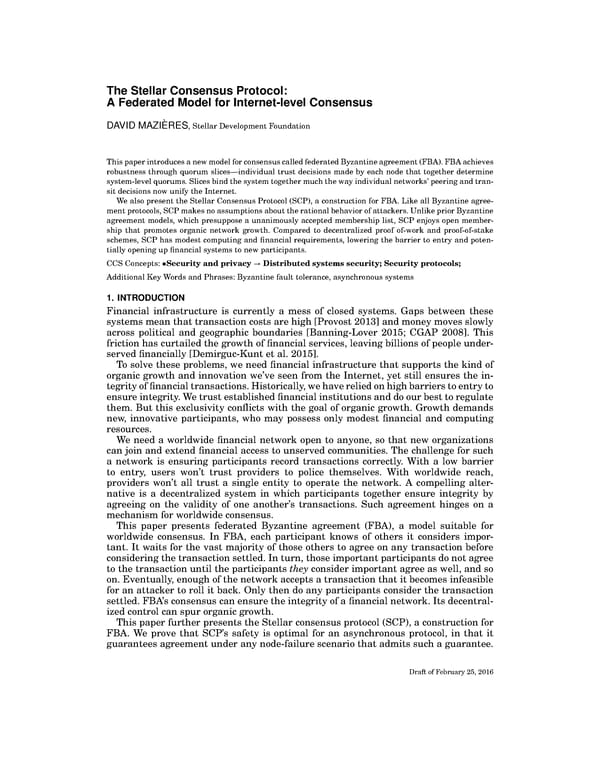TheStellar Consensus Protocol: AFederatedModelforInternet-level Consensus ` DAVIDMAZIERES,StellarDevelopmentFoundation ThispaperintroducesanewmodelforconsensuscalledfederatedByzantineagreement(FBA).FBAachieves robustness through quorum slices—individual trust decisions made by each node that together determine system-level quorums. Slices bind the system together much the way individual networks’ peering and tran- sit decisions now unify the Internet. Wealsopresent the Stellar Consensus Protocol (SCP), a construction for FBA. Like all Byzantine agree- mentprotocols,SCPmakesnoassumptionsabouttherationalbehaviorofattackers.UnlikepriorByzantine agreement models, which presuppose a unanimously accepted membership list, SCP enjoys open member- ship that promotes organic network growth. Compared to decentralized proof of-work and proof-of-stake schemes, SCP has modest computing and financial requirements, lowering the barrier to entry and poten- tially opening up financial systems to new participants. CCSConcepts:•Securityandprivacy→Distributedsystemssecurity;Securityprotocols; Additional Key Words and Phrases: Byzantine fault tolerance, asynchronous systems 1. INTRODUCTION Financial infrastructure is currently a mess of closed systems. Gaps between these systems mean that transaction costs are high [Provost 2013] and money moves slowly across political and geographic boundaries [Banning-Lover 2015; CGAP 2008]. This friction has curtailed the growth of financial services, leaving billions of people under- served financially [Demirguc-Kunt et al. 2015]. To solve these problems, we need financial infrastructure that supports the kind of organic growth and innovation we’ve seen from the Internet, yet still ensures the in- tegrityoffinancialtransactions.Historically,wehavereliedonhighbarrierstoentryto ensureintegrity. Wetrustestablishedfinancialinstitutionsanddoourbesttoregulate them. But this exclusivity conflicts with the goal of organic growth. Growth demands new, innovative participants, who may possess only modest financial and computing resources. Weneed a worldwide financial network open to anyone, so that new organizations can join and extend financial access to unserved communities. The challenge for such a network is ensuring participants record transactions correctly. With a low barrier to entry, users won’t trust providers to police themselves. With worldwide reach, providers won’t all trust a single entity to operate the network. A compelling alter- native is a decentralized system in which participants together ensure integrity by agreeing on the validity of one another’s transactions. Such agreement hinges on a mechanismforworldwideconsensus. This paper presents federated Byzantine agreement (FBA), a model suitable for worldwide consensus. In FBA, each participant knows of others it considers impor- tant. It waits for the vast majority of those others to agree on any transaction before considering the transaction settled. In turn, those important participants do not agree to the transaction until the participants they consider important agree as well, and so on. Eventually, enough of the network accepts a transaction that it becomes infeasible for an attacker to roll it back. Only then do any participants consider the transaction settled. FBA’s consensus can ensure the integrity of a financial network. Its decentral- ized control can spur organic growth. This paper further presents the Stellar consensus protocol (SCP), a construction for FBA. We prove that SCP’s safety is optimal for an asynchronous protocol, in that it guarantees agreement under any node-failure scenario that admits such a guarantee. Draft of February 25, 2016
 The Stellar Consensus Protocol Page 1 Page 3
The Stellar Consensus Protocol Page 1 Page 3